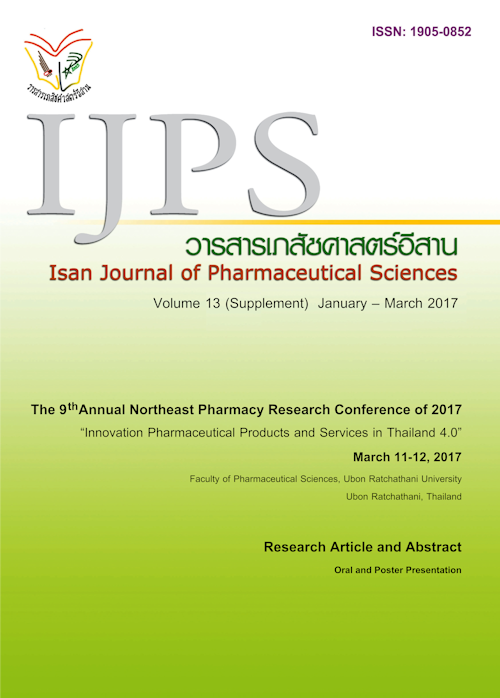Improving Antibiotics Adherence by Antibiotics Education with Medisafe® Application Compared with Routine Service in University Pharmacy
Main Article Content
Abstract
Introduction: Nonadherence of antibiotics in community pharmacy can cause ineffective treatment and bacterial resistance. The increasing of antibiotic resistance rate was important public health problem in Thailand. The objective of this randomized controlled trial was to determine if an increase in adherence of antibiotics usage occurred by providing antibiotics education and using the |MediSafe®} when compared to the routine services of the MSU community pharmacy. Methods: Sixty patients who diagnosed with tonsillitis, pharyngitis, sinusitis, acute diarrhea or uncomplicatedcystitis between January and March 2016 were included. The intervention group was given antibiotics education and MediSafe® for medication reminder. Both groups were tested on antibiotics knowledge before and after the experiment and were followed up two times; three days after taken the medicine and at the end of the experiment. The percent of adherence in antibiotics usage was also assessed. Results: The number of patients in the experimental group who correctly used antibiotics was statistically higher than the control group. (30 and 16; respectively, p<0.001). The percentage of adherence in the experimental group was significantly higher than the control group (97.0±5.81 and 77.2±14.84; respectively, p<0.001). The patients who had improved clinical symptoms in both groups was not different (p>0.05). The average scores of knowledge on antibiotics in the experimental group was statistically significantly higher than the control group (12.5±2.01 and10.0±2.31, respectively, p<0.001). Conclusions: The study showed that MediSafe® along with antibiotics education can improve adherence in antibiotics therapy.
Article Details
In the case that some parts are used by others The author must Confirm that obtaining permission to use some of the original authors. And must attach evidence That the permission has been included
References
Chokejindachai. Current situation of the antimicrobial resistance in Thailand: a review. Health Systems Research Institute. 2007
Nick AF, Butler CC, Hood K, Simpson S, Wood F, Nuttall J, et al. Effect of using an interactive booklet about childhood respiratory tract infections in primary care consultations on reconsulting and antibiotic prescribing: a cluster randomised controlled trial. BMJ 2009; 339: b2885
Phookonhchai P. (2011). Telephone follow-up and educational interventions to improve treatment adherence in patients taking antibiotics. Mahasarakham University, Mahasarakham.
Sabin LL, DeSilva MB, Gill CJ, Ma ZL, Vian T, Wubin X, et al. Improving Adherence to Antiretroviral therapy with trigger real time text message reminder: The China through Technology study (CATS). JAIDS Journal of Acquired Immune Deficiency Syndromes Publish Ahead of Print. 2015
Suttajit S. A review of antimicrobial drug resistance situation in various nations. Social pharmacy research unit. Mahasarakham university; 2009.
Suwannatri D. (2011) Improving ahherence of antibiotics use with educational booklet and reminder card in patients taking antibiotics. Mahasarakham University, Mahasarakham.
Urien AM, Guillen VF, Beltran DO, Pinzotas CL, Perez ER, Arocena MO, et al. Telephonic back-up improves antibiotic compliance in acute tonsillitis/pharyngitis. International Journal of Antimicrobial Agents 23. 2004; 138u143


